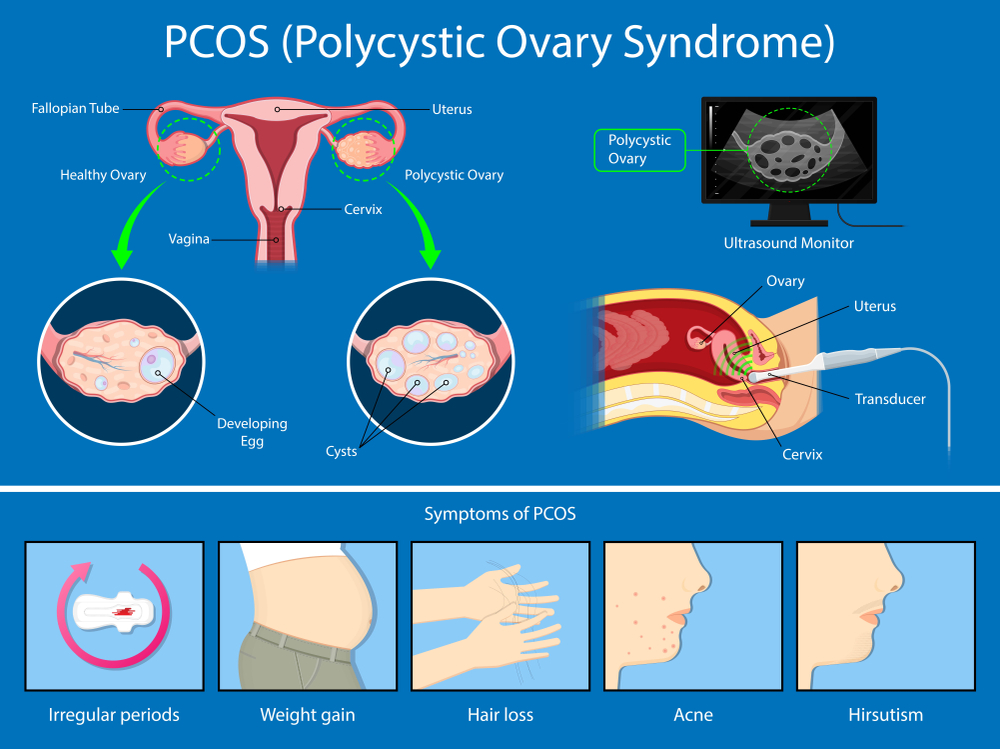PCOS and Infertility: Causes, Effects on fertility, and Complications

Polycystic ovary syndrome (PCOS) is a health condition that generally involves metabolism issues along with hormonal imbalances. As the name implies, this particular health condition usually affects the ovaries and diminishes their capabilities. Due to this reason, many people tend to consider PCOS and infertility to be synonymous.
However, in actuality, that’s not the case. Even if you are suffering from PCOS, you can still get pregnant and conceive a healthy child. But, if left untreated, PCOS may lead to infertility. According to research, PCOS can affect around 5% to 13% of people of reproductive age. But, if diagnosed early, then the health condition can be adequately treated.
So, here, we will shed light upon the fundamentals of the disease, its causes, the way it promotes fertility, and many more. Let's begin.
Causes of PCOS
The main reason behind PCOS and infertility is still not known. However, according to the doctors, there are some factors, which can promote this particular condition. These are:
- Genetic: Many types of research over years, have suggested that PCOS can be hereditary. Thus, someone in your family (mother or grandmother) had suffered from this issue; then it might occur to you as well.
- Excessive Insulin: If the cells present in your body become resistant to insulin, then the BP level will increase. This, in turn, can boost the production of androgen and cause ovulation-related difficulties. It is known to be one of the main causes of PCOS.
- Ovarian Inflammation: Various health conditions can cause severe ovarian inflammation. This, in turn, can, sometimes, increase the production of androgen and lead to PCOS. It can cause the deterioration of blood vessels and the health of your heart.
How Does PCOS Impact Fertility?
The condition of PCOS can trigger the fertility of an individual in various ways. Primarily, the health condition affects the ovulation procedure of a woman’s body. This, sequentially, prevents the follicles of the ovary from maturing properly.
In addition, a hormonal imbalance can participate in this aspect by restricting the uterus lining's growth. Thus, its organ's strength of producing and nurturing mature eggs begin to diminish. This is yet another way in which PCOS causes infertility.
Complications of PCOS
Infertility can be considered to be one of the most significant complications of PCOS. However, the health condition can lead to various other issues as well. Some of these are:
- Sleep apnea (or the inability to sleep, especially during nighttime)
- Rapid weight gain (it can be caused by both the lack of sleep and other issues)
- A sudden increase in the cholesterol level of one’s body
- Heart disease (caused by a high level of cholesterol and the weakening of blood vessels)
- Anxiety and depression (might be caused by the sudden hormonal changes)
- Diabetes or high blood sugar
- Cancer of the uterus (endometrial cancer)
As per the reports of OWH, the women who are suffering from PCOS and infertility will develop diabetes or pre-diabetes after 40.
How is PCOS Treated?
As of now, there is no cure or proper treatment procedure available for PCOS. Thus, your doctor might attempt to prevent the causes of PCOS and treat the severity of its symptoms. However, the signs of the disease tend to vary a lot from one person to another. Thus, the PCOS Treatment in Noida procedure of the same might change too.
The following are some of the steps that your doctor might take to treat your PCOS-related issues.
- Usage of Birth Control Pills: The birth control medications are generally provided to PCOS patients to prevent hormonal imbalances. However, it would be best if you were cautious while taking these pills. If you do not maintain a proper routine and end up consuming them too frequently, it might lead to abnormal vaginal bleeding.
- Medication for Diabetes: As mentioned before, most women suffering from PCOS also tend to develop diabetes. Thus, if the same has happened in your case as well, then your physician would try to diminish it through medication. Besides this, you might also need to follow a healthy and nutrition-rich diet and do regular exercise to stabilize your blood sugar level.
- Insulin-sensitizing Medicine: The abnormal production of insulin is yet another issue that might prompt massive androgen production. Thus, your doctor might also ask you to take insulin-sensitizing medication to reduce its severity. Furthermore, it might help in maintaining the hormonal imbalances and reduce the risk of further complications.
- Regular Exercising: Maintaining a healthy weight becomes exceptionally crucial for almost everyone who is suffering from PCOS. Therefore, to do so, you will need to indulge in cardio exercises regularly. You can try out running, jumping ropes, and some other forms of workouts. But, if you cannot perform these activities, you can also take walks of around 10,000 steps daily. Just be sure to avoid soft drinks and unhealthy diets as much as possible.
When to Visit Doctor?
Polycystic ovary syndrome (PCOS), a disorder associated with an imbalance in female sex hormones, occurs in both young and adult women. Abnormal hair growth, acne, weight gain, thinning hair, irregular periods, depression, and ovarian cyst are significant symptoms of the disorder, with infertility being the main complication.
Irrespective of whether you want to have kids or not, it is advisable and recommended to consult the best gynaecologist in Noida at the earliest if any of the above symptoms show up. Although there is no cure now, there is a definite treatment that can go miles in improving your health.
Conclusion
If left unattended, PCOS can cause massive hormonal imbalance and cause interference in the ovulation procedure. Therefore, it almost becomes a must for you to treat it as promptly as possible. With medical intervention, you can treat this issue pretty quickly and get back to your daily routine again. Just make sure to take your medications daily and let them do the trick for you!